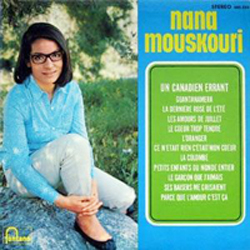






"Un Canadien errant" - 180 years!
« This so beautiful and so sad song from our folklore tells the pain of a Patriot in exile banished from his hearths. Through your sweet and powerful voice, that song dedicated to the Love of our nation has universal dimensions. » Pauline Marois, former Prime Minister of Quebec, May 28, 2013. |







Each country has poems and songs that are perpetuated in the collective memory. In France, for example, we could name "Le déserteur", a committed text by Boris Vian. In Quebec, there's the cantilena "Un Canadien errant". It celebrates its 180th anniversary this year. Let us remember its author, the context in which it was written, why it survived. And how Nana Mouskouri, a Greek singer, let herself moved by that lament so that she included it in her concerts and recorded it.
We owe that song to Antoine Gérin-Lajoie (1824-1882), poet, lawyer, journalist and novelist. If the versions concerning its origins vary, the most plausible remains the one about his manuscript entitled "Souvenirs du Collège". In it, he relates: « I wrote that song in 1842 when I was doing my rhetoric in Nicolet. I did it one evening in my bed at the request of my friend Cyp Pinard who wanted a song to the tune "Par derrière chez ma tante"... It was published in 1844 in Charivari canadien with my initials (A. G. L.)... » (1) |
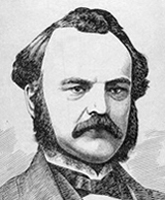 |
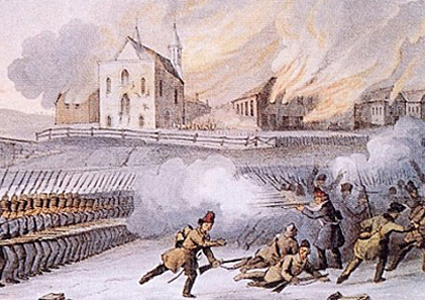 |
This composition is a continuation of the Patriots' condemnation of 1837-1838 who rebelled against the reduction in the power of the French-speakers. It is said that the author saw on the St. Lawrence River the boats that deported them to Bermuda and Australia. With these ones we must add those who took refuge in the United States and who were banished in Canada, the prisoners, as well as those who were hanged. Mr. Gérin-Lajoie witnessed the powerness families who mourned the absence of their loved ones. In order to express the despair felt during the years of exile, he chose a melancholic folk tune. As for the call-and-response songs the verse are repeating. |
The song, reflecting the popular sentiment, will be on the lips of French Canadians. They fought hard to preserve their language and culture. The Acadians also experienced the deportation and the exile between 1755 and 1763. In 1884, they adapted the piece which became "Un Acadien errant". Little by little, that ballad is part of our history; it appears in our books of songs and during decades it is taught at school and we sing it with the family. It will be recorded many times with various arrangements and translated in English.
During her first tour with Harry Belafonte during the fall of 1964, Nana was introduced to folk music. She listened to Joan Baez, Judy Collins, Pete Seeger and Bob Dylan who became a source of inspiration. By the same occasion, she met the Anglo-Canadian duo Ian & Sylvia Tyson who recommended her to sing that song when she comes to Quebec. They recorded it two years before. During the Belafonte tour in 1965, Nana decided to include it in her program, as well in Montreal, in Toronto and as in Vancouver. The representatives of London Records tell her that it's not new, that everybody knows it. But she followed her musical instinct because it gave her the emotion needed to transmit it. Nana relates the audience reaction in Montreal: « There was not a whisper in the hall! When my last note faded, a huge cry ran out from the 3,000 people in the audience, accompanied by a clatter of seats as they rose to their feet. . » (2) |
 |
During this first visit, with "Un Canadien errant" Nana created a feeling of belonging with the Canadian public. Obviously, the song has more impact among Francophones, besides being in their language, it refers to them. During her subsequent tours in Quebec, Nana often chooses to end her concerts singing it a capella. Each time, it's a way of paying tribute to the first North American audience who accepted her.
|
If initially her record company wasn't enthusiastic, in November 1966, the song became the title of her new francophone album. The author's name doesn't appear. It's only mentioned (Traditional). Her version includes four of the seven strophes and only her guitarist, George Petsilas, accompanies her. That song is an exclusivity for Canada. |
In France, the equivalent album is titled "Le coeur trop tendre" and includes three different songs. Following the obtention of the Grand Prix de l'Académie Charles Cros, we got it imported. On the cover, there is a label mentioning it. That record will make her known as a French singer and will be released in several countries under the title "Nana Mouskouri in Paris." |
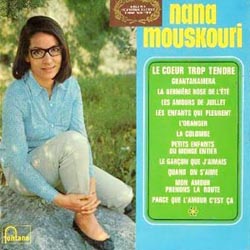 |
"Un Canadien errant", one of her most common 33 rpm will remain on the market until 1987. This record often served as reference for the title as Nana made of it a popular song. Many rediscovered it thanks to the beauty of her voice, her impeccable diction and her interpretation of quality. About that, Maurice Desjardins, journalist for Dimanche-Matin, wrote: « She gave to our "Canadien errant" accents of sincerity so that we could have sworn that she was a Quebecer in exile wracked with homesickness. » (3) The song was also released on 45 rpm. The labels of turquoise, red and light red colour show the different pressings. Its absence on compilations confirms that it's a special recording. Exceptionally, in 1976 for a short time, it was released in the double album "Pleins feux sur ... Vol. 2". Then we will have to wait until 2004 before it be reissued, this time in "Un Canadien errant / A Canadian Tribute", a collection of her Canadian songs. Three years later, it is included in the volume 5 of the box set "Les 100 plus belles chansons".
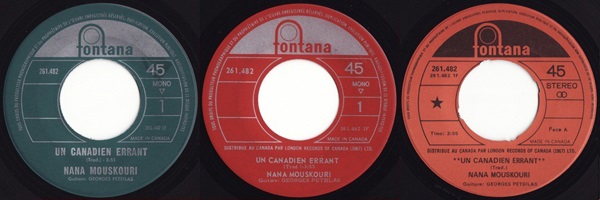

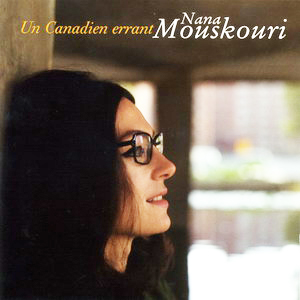

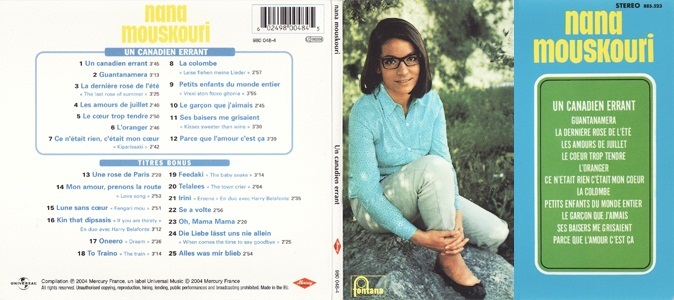 |
In May 2004, her French Anthology entitled "Nana Mouskouri Collection" was launched in France. Surprise for that album, the Canadian edition was chosen. Like the entire serie, it's made as digipack and inside there's an explicit booklet. It indicates which orchestras accompanie her but also the name of the studios and the recordings dates. In addition, on that CD 13 bonus tracks have been added. Then Europeans started knowing that song. |
Since its creation during the fall of 1842, "Un Canadien errant" has come a long way. Before and after the disc invention, that song has been transmitted from generation to generation. During the 1960s, following the folk movement, Nana learned the existence of that ballad. Moved, she added it to her repertoire and her wonderful interpretation delighted the audience in our homeland. And although it be a song that belongs to us, with Youtube and the download purchase, it's now accessible to everyone.
Un Canadien errant, (A wandering Canadian,)
Banni de ses foyers, (Banished from his hearths,)
Parcourait en pleurant (Traveled, weeping, through)
Des pays étrangers.
(Foreign countries.)
Un jour, triste et pensif, (One day, sad and pensive,)
Assis au bord des flots. (Sitting at the waters' edge.)
Au courant fugitif (To the rushing current)
Il adressa ces mots:
(He said these words:)
« Si tu vois mon pays, ("If you see my country,)
Mon pays malheureux, (My unhappy country,)
Va, dis à mes amis (Go tell my friends)
Que je me souviens d'eux.
(That I remember them.)
« Ô jours si pleins d'appas, ("O days so full of charms,)
Vous êtes disparus, (You have disappeared,)
Et ma patrie, hélas! (And my country, alas!)
Je ne la verrai plus!
(I will never again see it!)
« Plongé dans les malheurs, ("Plunged in the unhappinesses,)
Loin de mes chers parents, (Far from my dear parents,)
Je passe dans les pleurs (Through the tears I pass)
D’infortunés moments. (In luckless moments.)
Pour jamais séparé (Forever set apart)
Des amis de mon coeur (From my sweet friends)
Hélas! oui, je mourrai (Alas! Yes, I will die)
Je mourrai de douleurs. (I will die of sadness)
« Non, mais en expirant, ("No, but while dying,)
Ô mon cher Canada! (O my dear Canada!)
Mon regard languissant (My longing look)
Vers toi se portera. »
(Will go toward you.")
(1) Souvenirs du collège (2) Nana Mouskouri Collection, p. 71 (3) Dimanche-Matin, January 29, 1967, "Beaux sons, soleil grec ...voilà Nana Mouskouri" p. 27 |